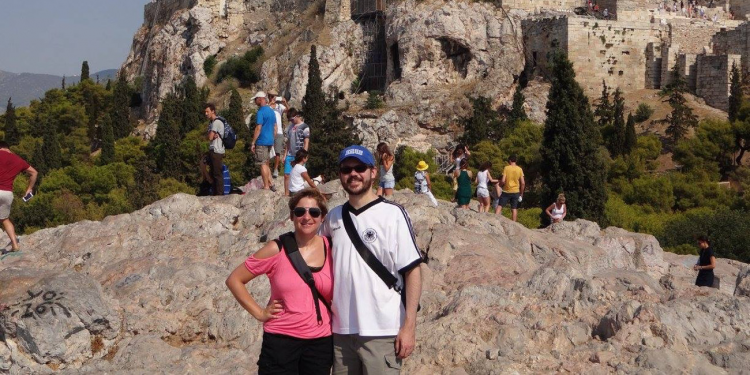
Amanda comes from the USA. She has lived in Derby, Brooklyn and Washington before moving to Greece following her husband's job posting. In this Interview, she shares her views about life in Greece.
Where are you from, Amanda, and what are you doing nowadays?
I'm a 30-something stay-at-home mom from the US. Before coming to Athens, we lived in Derby, KS, just outside of Wichita. It was a culture shock, for sure, but we had lived in Brooklyn and Washington DC previously, so we were familiar with big cities and mass transit. In Athens, I'm still a stay-at-home mom, but I'm trying to see and experience as much as I can here with my family.
Why did you choose to expatriate to Greece?
My husband works for the US government, so his job brought us here. We'll be living here for a few years.
As a US expat, what where the procedures you had to follow to move there?
Fortunately, my husband's employer handled all of the moving details. They shipped some of our items, stored the rest back in the US, and provided us with a furnished dwelling. They also handled shipping and licensing our car.
How long have you been in the country?
8 months.

What has attracted you to Athens?
Having once lived in Florida, I was the most excited about the climate and the beaches. I was also pleased to discover how family-oriented the Greeks are, and how welcoming and affectionate they are with children. And, of course, there is an amazing amount of history and archeology to see in and around the city.
What has surprised you the most at your arrival?
Traffic! I was warned that driving in Athens was a bit insane, but with motorbikes zipping in and out of lanes, down the wrong way on streets, and even on the sidewalks, it's both perilous to drive and to cross the street! I caught my son repeating something I apparently say quite often, “They drive like maniacs here!” However, with a few weeks of practice, I could drive here with relative confidence. Squeezing around parked cars in our neighborhood is the most challenging part. If it looks like a viable spot, someone will park there.
What are the local labor market's features? Is it easy for an expat to find a job there?
I don't have any experience looking for employment or working here. Most of the people I know work for the embassy, and they do have jobs open for spouses of current employees. But I don't know much about that.
How do you find the Greek lifestyle?
As an American used to quick service, it has been a challenge to adapt to “Greek time.” I've had to learn to linger, expect that classes or events won't start exactly when scheduled, and food won't be rushed right out to your table. We're used to stores being open 24/7, and you definitely don't get that here. Stores often close early, and all the shops are closed on Sundays. The entire city seems to go on vacation in August – many businesses and restaurants completely close up shop for the entire month.

Have you been able to adapt yourself to the country and to its society?
For the most part, yes. One societal norm I appreciate are “quiet hours.” These are designated hours during the day, different for winter and summer, where residents aren't allowed to mow their lawns, play loud music, or make a lot of noise to disturb their neighbors. They take it quite seriously here. It's been great for my toddler, who needs a nice, long quiet nap in the afternoons.
I've also found it's fairly easy to communicate in English. I've learned a few Greek words and phrases, but most everyone I've met can speak English pretty well. Even if they say they know just a little, I'm always surprised by how well they speak. I have had a few amusing encounters where I've had to pantomime what I'm trying to say. And many grandmothers who don't speak English stop me to enthusiastically admire my baby. I'd say learning Greek is not a requirement for getting by in Athens, but learning the Greek letters has helped with reading the street signs, which are mostly written in Greek and English, but not always.
What does your every day life in Athens look like?
It's fairly typical for a stay-at-home mom, with a few exceptions. Once a week, I buy most of our produce at the Laiki, the neighborhood farmer's market. It's an amazing cultural experience, and the place I've felt the most immersed in Greek life. Vendors shout out in Greek about their wares, and you can buy everything, from produce and fish to clothing, rugs, tools, and cleaning supplies. Even underwear! You name it, they're selling it.
Back in the US, I used to take long evening walks with my son when he was a toddler around our carefully manicured gated community. But the sidewalks in our neighborhood in Athens are in such disrepair, and so clearly not meant for anything on wheels, that aside from the occasional walk to the park, my one-year-old daughter mostly plays indoors. Once or twice a week, I take my toddler to Gymboree for classes in both Greek and English. And we often attend and host play dates with other Embassy families and children my son has met at his school.
While my babysitter watches my youngest twice a week, I go to yoga and Pilates classes, taught entirely in Greek. The instructor will usually throw in a little English if it looks like I'm not following along. It's a bit of a challenge, but I do enjoy practicing, even if I can't understand what is being said.

Any particular experience in the country you would like to share with us?
My favorite sight-seeing excursion so far is an off-the-beaten-path village about an hour and a half north of Athens called Livadia. There's a beautiful stream that runs through the center of the town, with numerous picturesque waterfalls. There's a shrine near the top of a mountain you can climb up to – an exhausting climb, but the views are worth it.
What is your opinion on the cost of living in Athens? Is it easy for an expat to live there?
As far as the cost of goods and services, it varies. For instance, my hair dresser is very affordable compared to some hairdressers in the States, and you can get food delivered straight to your door for next to nothing. But many goods are subject to a high sales tax, called the VAT, set at 23%. As a US government employee, we can get reimbursed if we buy something worth hundreds of Euros, but for smaller things like clothes, shoes, and groceries, the VAT makes it more expensive. We order many things online from Amazon or Walmart to save money.
How do you spend your leisure time?
On the weekends, my family and I will usually go sight-seeing in or around Athens, or we'll go to the beach. We've taken a few long weekends and day trips to places further afield, like Delphi and Corinth. And we've taken longer vacations in nearby European countries. We plan to see more of the Greek Islands next year.
Your favorite local dishes?
Fried Formaela cheese is our favorite. Drizzle it with some honey, and you'll be clamoring for more. Gyros and fries (They call them simply “potatoes” here.) are always tasty, and there are so many delicious varieties of honeyed pastries at the bakeries. Spinach and cheese spanakopita is my daughter's favorite. Also, Greece specializes in an amazing array of locally produced honey. I never knew honey could have so many different subtle flavors.

What do you like the most about Greece?
The food here is fantastic – not just Greek food, but all types of cuisines – and the mild winters are quite nice.
What do you miss the most about your home country?
We miss our family the most. It's a very long and expensive flight for them, and the journey is arduous for us with two children. Thankfully, we keep in touch via FaceTime and Facebook, and they can read about what we've been up to on my blog.
What has motivated you to write your blog “Greece is the Word”? How does it help?
I've been blogging for almost 12 years now, starting with our first move to The Big Apple. The subject matter changed a bit when we had kids, but whether I was writing about my latest D-list celebrity sighting or my complete ineptitude at potty training, finding the humor in an otherwise embarrassing or upsetting situation helps keep me sane.
When we decided to embark on this trans-Atlantic move, I started an entirely new blog called “Greece is the Word” that would chronical our time here in Athens. Family and friends can follow our adventures, making me feel slightly less guilty about leaving them behind. And perhaps, anyone living or planning to move here could glean some useful information or advice by reading it, too.
Would you like to give any advice to soon-to-be expatriates in Greece?
Try to learn a few Greek phrases and letters, but don't feel like you've got to have a handle on the language. It's a difficult one to learn. It took me months to be able to pronounce “Thank You” in Greek. And I still butcher it sometimes. Take mass transit and taxis wherever you can, especially if you're going into the city. Driving and navigating are maddening, but parking will drive you clinically insane. Google Maps will save your life, as a driver or a pedestrian. People smoke everywhere here, so be prepared. And most of all – Relax. Things operate at a different pace here. Get a coffee. Go to the beach. Enjoy yourself.
What are your plans for the future?
So far, we love living abroad. It has been an amazing experience for us and our children. When our tour ends here, we will be moving back to the US. But we hope to get a chance to move to another city in Europe someday. There's so much we want to see and do, and I doubt we'll be able to fit it all in.



















